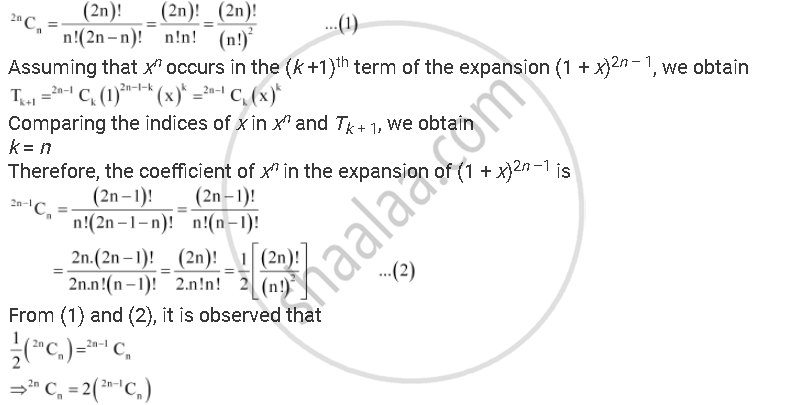Advertisements
Advertisements
प्रश्न
Prove that the coefficient of xn in the expansion of (1 + x)2n is twice the coefficient of xn in the expansion of (1 + x)2n–1 .
उत्तर

Comparing the indices of x in xn and in Tr + 1, we obtain
r = n
Therefore, the coefficient of xn in the expansion of (1 + x)2n is

Therefore, the coefficient of xn in the expansion of (1 + x)2n is twice the coefficient of xn in the expansion of (1 + x)2n–1.
Hence, proved.
APPEARS IN
संबंधित प्रश्न
Find the 4th term in the expansion of (x – 2y)12 .
Find the middle terms in the expansions of `(x/3 + 9y)^10`
Find a positive value of m for which the coefficient of x2 in the expansion
(1 + x)m is 6
Find the middle term in the expansion of:
(ii) \[\left( \frac{a}{x} + bx \right)^{12}\]
Find the middle term in the expansion of:
(iv) \[\left( \frac{x}{a} - \frac{a}{x} \right)^{10}\]
Find the middle terms(s) in the expansion of:
(ii) \[\left( 1 - 2x + x^2 \right)^n\]
Find the middle terms(s) in the expansion of:
(iii) \[\left( 1 + 3x + 3 x^2 + x^3 \right)^{2n}\]
Find the middle terms(s) in the expansion of:
(iv) \[\left( 2x - \frac{x^2}{4} \right)^9\]
Find the middle terms(s) in the expansion of:
(x) \[\left( \frac{x}{a} - \frac{a}{x} \right)^{10}\]
Find the term independent of x in the expansion of the expression:
(i) \[\left( \frac{3}{2} x^2 - \frac{1}{3x} \right)^9\]
Find the term independent of x in the expansion of the expression:
(iii) \[\left( 2 x^2 - \frac{3}{x^3} \right)^{25}\]
Find the term independent of x in the expansion of the expression:
(iv) \[\left( 3x - \frac{2}{x^2} \right)^{15}\]
Find the term independent of x in the expansion of the expression:
(x) \[\left( \frac{3}{2} x^2 - \frac{1}{3x} \right)^6\]
If the coefficients of (2r + 1)th term and (r + 2)th term in the expansion of (1 + x)43 are equal, find r.
Prove that the coefficient of (r + 1)th term in the expansion of (1 + x)n + 1 is equal to the sum of the coefficients of rth and (r + 1)th terms in the expansion of (1 + x)n.
The coefficients of 5th, 6th and 7th terms in the expansion of (1 + x)n are in A.P., find n.
If in the expansion of (1 + x)n, the coefficients of pth and qth terms are equal, prove that p + q = n + 2, where \[p \neq q\]
In the expansion of (1 + x)n the binomial coefficients of three consecutive terms are respectively 220, 495 and 792, find the value of n.
If 3rd, 4th 5th and 6th terms in the expansion of (x + a)n be respectively a, b, c and d, prove that `(b^2 - ac)/(c^2 - bd) = (5a)/(3c)`.
If the 6th, 7th and 8th terms in the expansion of (x + a)n are respectively 112, 7 and 1/4, find x, a, n.
If the 2nd, 3rd and 4th terms in the expansion of (x + a)n are 240, 720 and 1080 respectively, find x, a, n.
Find a, b and n in the expansion of (a + b)n, if the first three terms in the expansion are 729, 7290 and 30375 respectively.
If p is a real number and if the middle term in the expansion of \[\left( \frac{p}{2} + 2 \right)^8\] is 1120, find p.
Write the middle term in the expansion of `((2x^2)/3 + 3/(2x)^2)^10`.
If in the expansion of \[\left( x^4 - \frac{1}{x^3} \right)^{15}\] , \[x^{- 17}\] occurs in rth term, then
Find the term independent of x, x ≠ 0, in the expansion of `((3x^2)/2 - 1/(3x))^15`
Find the middle term (terms) in the expansion of `(x/a - a/x)^10`
If p is a real number and if the middle term in the expansion of `(p/2 + 2)^8` is 1120, find p.
Find the term independent of x in the expansion of (1 + x + 2x3) `(3/2 x^2 - 1/(3x))^9`
In the expansion of `(x^2 - 1/x^2)^16`, the value of constant term is ______.
The position of the term independent of x in the expansion of `(sqrt(x/3) + 3/(2x^2))^10` is ______.
The number of rational terms in the binomial expansion of `(4^(1/4) + 5^(1/6))^120` is ______.
Let for the 9th term in the binomial expansion of (3 + 6x)n, in the increasing powers of 6x, to be the greatest for x = `3/2`, the least value of n is n0. If k is the ratio of the coefficient of x6 to the coefficient of x3, then k + n0 is equal to ______.
If the coefficient of x10 in the binomial expansion of `(sqrt(x)/5^(1/4) + sqrt(5)/x^(1/3))^60` is 5kl, where l, k ∈ N and l is coprime to 5, then k is equal to ______.
